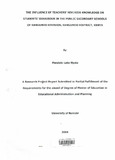| dc.description.abstract | This study was mainly on the influence of teachers' HIV/AIDS Education
Knowledge on the students' behaviour in the public secondary schools of
Kangundo Division, Kangundo district, Kenya. The study had five objectives
including to determine the level of awareness of the education sector policy on
HIV/AIDS among teachers, to determine the level of knowledge of HIV/AIDS
education among teachers, to determine the sources of the HIV/AIDS knowledge
among teachers and students and to identify the behavioural characteristics of the
secondary school students in the context of the HIV/AIDS education programme.
Literature focused on the HIV/AIDS concept, global and national HIV/AIDS
trends, knowledge behavior and the HIV/AIDS education sector policy. The
research design used was Expost Facto. The researcher used simple random
sampling to pick five teachers and ten students in form three per school.
The findings of the study revealed that teachers are aware of the education sector
policy on HIV/AIDS but the HIV/AIDS curriculum has not been uniformly
implemented at the same time. The study established that teachers are not well
prepared to handle the HIV/AIDS Education programme and majority of them are
not in serviced on HIV/AIDS education. The main sources of the HIV/AIDS
information amongst the teachers are Jell ow teachers; newspapers, television and
religious leaders, and these sources were found to be inadequate. Among the
students, the main sources are teachers, clubs and societies, and religious leaders.
On the characteristics of the students' behaviour, the findings revealed that they -
are engagmg m risky sexual behaviour despite the implementation of the
HIV/AIDS programme.
The researcher came up with several recommendations. Teachers should be trained
more and oriented in HIV IAIDS curriculum through in-service courses and
seminars. Only a few teachers have already undergone training and hence in service
programme should target more teachers.
Also, Resource materials such as videotapes, posters and magazines should be
used in schools. This is because these are few or lacking completely in secondary
schools. This would mainly benefit the students whose sources are quite
inadequate.
Schools should also procure electronic equipment and a variety of print media to
implement HIV/AIDS Education programme effectively. In Secondary schools
print media sources are scarce among the students. The provision should be done
by the headteachers in conjunction with the Ministry of Education officers.
The researcher made several suggestions for further study and one of them was
that since this study was limited to one Division, there is need for a replication of
the study using a larger area to illicit more accurate national perspective of
teachers' HIV/AIDS knowledge as it relates to the student behaviour. | en |

